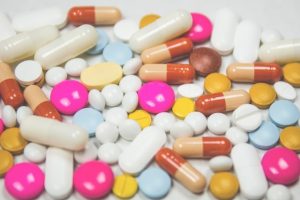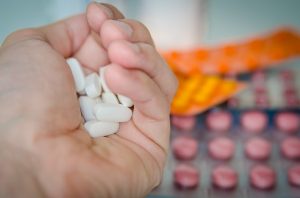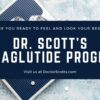Read on to see why the supplements ordered to be tested by the NY Attorney General show only 4% of Walmart supplements tested, contain the actual ingredients as listed on the label. GNC, Target, Walgreens, also named in the investigation!
Dr. Scott’s only sells high-quality supplements that submit to 3rd party Independent Lab Testing. Beware of counterfeit or outdated products sold on Amazon! Read on for more…CBS NEWS: February 3, 2015
Store Brand Supplements aren’t what they claim to be
 Numerous store brand supplements aren’t what their labels claim to be, according to an ongoing investigation that subjected popular herbal supplements to DNA testing. The investigation, led by New York Attorney General Eric Schneiderman, focused on a variety of herbal supplements from four major retailers: GNC, Target, Walmart and Walgreen Co. Lab tests determined that only 21 percent of the products actually had DNA from the plants advertised on the labels. “This investigation makes one thing abundantly clear: The old adage ‘buyer beware’ may be especially true for consumers of herbal supplements,” Schneiderman said. His office issued cease and desist letters to the retailers on Monday telling them to stop sales of the products.
Numerous store brand supplements aren’t what their labels claim to be, according to an ongoing investigation that subjected popular herbal supplements to DNA testing. The investigation, led by New York Attorney General Eric Schneiderman, focused on a variety of herbal supplements from four major retailers: GNC, Target, Walmart and Walgreen Co. Lab tests determined that only 21 percent of the products actually had DNA from the plants advertised on the labels. “This investigation makes one thing abundantly clear: The old adage ‘buyer beware’ may be especially true for consumers of herbal supplements,” Schneiderman said. His office issued cease and desist letters to the retailers on Monday telling them to stop sales of the products.
The investigation found supplements, including echinacea, ginseng, St. John’s wort, garlic, Ginkgo Biloba and saw palmetto, were contaminated with substances including rice, beans, pine, citrus, asparagus, primrose, wheat, houseplant and wild carrot. In many cases, unlisted contaminants were the only plant material found in the product samples. The retailer with the poorest showing was Walmart, where only 4 percent of the products tested showed DNA from the plants listed on the labels.
Production, Processing, Testing and Quality Control
Schneiderman asked the companies to provide detailed information on production, processing, testing and quality control for herbal supplements sold at their stores. Walmart spokesman Brian Nick said the company is immediately reaching out to suppliers and will take appropriate action. Walgreens and GNC pledged to cooperate with the attorney general. “We take these issues very seriously and as a precautionary measure, we are in the process of removing these products from our shelves as we review this matter further,” Walgreen spokesman James Graham said. Target didn’t initially respond to a request for comment.
“We stand by the quality, purity, and potency of all ingredients listed on the labels of our private label products,” said GNC spokeswoman Laura Brophy.
 The investigation looked at six herbal supplements sold at stores across the state. Testing was performed by an expert in DNA barcoding technology, James Schulte II of Clarkson University in Potsdam, New York. The DNA tests were performed on three to four samples of each of the supplements purchased. Each sample was tested five times. Overall, 390 tests involving 78 samples were performed.
The investigation looked at six herbal supplements sold at stores across the state. Testing was performed by an expert in DNA barcoding technology, James Schulte II of Clarkson University in Potsdam, New York. The DNA tests were performed on three to four samples of each of the supplements purchased. Each sample was tested five times. Overall, 390 tests involving 78 samples were performed.
A DNA study conducted by the University of Guelph in 2013 also found contamination and substitution in herbal products in most of the products tested. One product labeled as St. John’s wort, often used to treat depression, contained Senna alexandrina, a plant with laxative properties. One ginkgo product was contaminated with black walnut, which could endanger people with nut allergies.
CHECK OUR WEBSITE BLOG FOR THE ATTORNEY GENERAL’S SPECIFIC FINDINGS!
The New York Attorney General’s office posted the following information on its website listing the supplements tested and what the investigation found:
GNC:
Six “Herbal Plus” brand herbal supplements per store were purchased and analyzed: Gingko Biloba, St. John’s Wort, Ginseng, Garlic, Echinacea, and Saw Palmetto. Purchased from four locations with representative stores in Binghamton, Harlem, Plattsburgh & Suffolk.
Only one supplement consistently tested for its labeled contents: Garlic. One bottle of Saw Palmetto tested positive for containing DNA from the saw palmetto plant, while three others did not. The remaining four supplement types yielded mixed results, but none revealed DNA from the labeled herb.
Of 120 DNA tests run on 24 bottles of the herbal products purchased, DNA matched label identification 22% of the time.
Contaminants identified included asparagus, rice, primrose, alfalfa/clover, spruce, ranuncula, houseplant, allium, legume, saw palmetto, and Echinacea.
Target:
Six “Up & Up” brand herbal supplements per store were purchased and analyzed: Gingko Biloba, St. John’s Wort, Valerian Root, Garlic, Echinacea, and Saw Palmetto. Purchased from three locations with representative stores in Nassau County, Poughkeepsie, and Syracuse.
Three supplements showed a nearly consistent presence of the labeled contents: Echinacea (with one sample identifying rice), Garlic, and Saw Palmetto. The remaining three supplements did not reveal DNA from the labeled herb.
Of 90 DNA tests run on 18 bottles of the herbal products purchased, DNA matched label identification 41% of the time.
Contaminants identified included allium, French bean, asparagus, pea, wild carrot and saw palmetto.
Walgreens:
Six “Finest Nutrition” brand herbal supplements per store were purchased and analyzed: Gingko Biloba, St. John’s Wort, Ginseng, Garlic, Echinacea, and Saw Palmetto. Purchased from three locations with representative stores in Brooklyn, Rochester, and Watertown.
Only one supplement consistently tested for its labeled contents: Saw Palmetto. The remaining five supplements yielded mixed results, with one sample of garlic showing appropriate DNA. The other bottles yielded no DNA from the labeled herb.
Of the 90 DNA test run on 18 bottles of herbal products purchased, DNA matched label representation 18% of the time.
Contaminants identified included allium, rice, wheat, palm, daisy, and dracaena (houseplant).
Walmart:
Six “Spring Valley” brand herbal supplements per store were purchased and analyzed: Gingko Biloba, St. John’s Wort, Ginseng, Garlic, Echinacea, and Saw Palmetto. Purchased from three geographic locations with representative stores in Buffalo, Utica, and Westchester.
None of the supplements tested consistently revealed DNA from the labeled herb. One bottle of garlic had a minimal showing of garlic DNA, as did one bottle of Saw Palmetto. All remaining bottles failed to produce DNA verifying the labeled herb.
Of the 90 DNA test run on 18 bottles of herbal products purchased, DNA matched label representation 4% of the time.
Contaminants identified included allium, pine, wheat/grass, rice mustard, citrus, dracaena (houseplant), and cassava (tropical tree root).
CHECK OUR WEBSITE BLOG FOR THE ATTORNEY GENERAL’S SPECIFIC FINDINGS!
Still have questions?
A member of our team can answer your specific questions on supplements and other health items. Contact us here.





